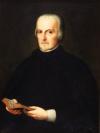Biography
Pedro Calderón de la Barca y Barreda González de Henao Ruiz de Blasco y Riaño usually referred as Pedro Calderón de la Barca, was a Roman Catholic priest, writer, poet and dramatist of the Spanish Golden Age. Born when the Spanish Golden Age theatre was being defined by Lope de Vega, he developed it further, his work being regarded as the culmination of the Spanish Baroque theatre. As such, he is regarded as one of Spain's foremost dramatists and one of the finest playwrights of world literature.
As stated by Goethe, Calderón tended to write his plays taking special care about their dramatic structure. Hence, he usually reduced the number of scenes in his plays if compared to those of Lope de Vega, so as to avoid any superfluous one and present only those essential to the play, also reducing the number of different meters in his plays for the sake of gaining a greater style uniformity. Although his poetry and plays leaned towards the culteranismo, he usually reduced the level and obscurity of that style by avoiding metaphors and references away from those that uneducated viewers could understand. However, he had a like for symbolism, for example making a fall from a horse a metaphor of a fall into disgrace, the fall representing dishonour; the use of horoscopes or prophecies at the start of the play as a way of making false predictions about the following to occur, symbolizing the utter uncertainty of future. Besides, probably influenced by Cervantes, Calderón realized that any play was but fiction, and that the structure of the baroque play was entirely artificial, so he sometimes makes use of meta-theatrical techniques such as making his characters comment jocosely the clichés the author is using and they are forced to follow. Some of the most common themes of his plays were heavily influenced by his jesuit education. For example, as a reader of Saint Thomas Aquinas and Francisco Suárez, he liked to confront reason against passions, intellect against instinct, or understanding against will. As many writers from the Spanish Golden Age, his plays usually show his vital pessimism, that is only softened by his rationalism and his faith in God; the anguish and distress usually found his oeuvre is better exemplified in one of his most famous plays, Life is a dream, in which Segismundo claims. ..






